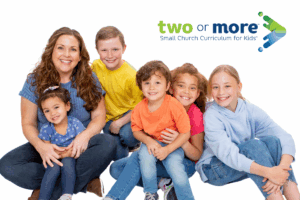 by Diana Jones
by Diana Jones
“Family ministry” seems to be the new buzzword for what the church once called, simply, children’s ministry. What is the difference?
A big portion of a children’s minister’s job is to make known to the leadership of a church that children have equal value in the kingdom of God and should hold a significant place in the life of the church (and the budget). As it does for adults, the church needs to offer a comprehensive program to meet children’s spiritual needs. One of the verses often used by children’s ministers to show value and give a biblical basis for children’s ministry is Mark 10:13-16.
People were bringing little children to Jesus to have him touch them, but the disciples rebuked them. When Jesus saw this, he was indignant. He said to them, “Let the little children come to me, and do not hinder them, for the kingdom of God belongs to such as these. I tell you the truth, anyone who will not receive the kingdom of God like a little child will never enter it. And he took the children in his arms, put his hands on them and blessed them” (Mark 10:13-16 NIV).
This passage serves as the basis for many children’s ministers as we focus our churches on children.
Generations of children go through our church programs, yet research by George Barna has brought to our attention an alarming trend. In Barna’s book, Transforming Your Children Into Spiritual Champions, it is brought to light that many of those children who come through our children’s programs, as well oiled as they are, go away from the faith and from our churches in later years. In his research he uncovers that the attitudes, values and lifestyles of these “churched” children are similar to the attitudes of non-Christians. Barna states that merely getting people to go to church regularly is not the key to them becoming mature Christians. Spiritual transformation requires more extensive investment in their ability to interpret all life situations in spiritual terms. What the children are learning at church is not being modeled or lived out in the home. This shocking research unveils a problem in our approach and our methodology. It forces us as children’s ministers to reevaluate how we do children’s ministry.
If Mark 10 speaks to the why we do children’s ministry, then Deuteronomy 6 speaks to thehow we do it-through family ministry. Family ministry becomes the methodology or the approach we use.
“These are the commands, decrees and laws the LORD your God directed me to teach you to observe in the land that you are crossing the Jordan to possess, so that you, your children and their children after them may fear the LORD your God as long as you live by keeping all his decrees and commands that I give you, and so that you may enjoy long life. Hear, O Israel, and be careful to obey so that it may go well with you and that you may increase greatly in a land flowing with milk and honey, just as the LORD, the God of your fathers, promised you. Hear, O Israel: The LORD our God, the LORD is one. Love the LORD your God with all your heart and with all your soul and with all your strength. These commandments that I give you today are to be upon your hearts. Impress them on your children. Talk about them when you sit at home and when you walk along the road, when you lie down and when you get up. Tie them as symbols on your hands and bind them on your foreheads. Write them on the doorframes of your houses and on your gates” (Deuteronomy 6:1-9 NIV). Here is a very relaxed paraphrase of this passage as it applies to us as ministers and parents of children. First, it should be noted that the passage is written by Moses to the people of Israel; people who are committed to daily surrender and obedience to God’s word in everyday life. It is specifically addressed to the parents and grandparents, those who have a growing daily relationship with Christ and it is not addressed to the church staff. (vs 1-2) This fact alone has many implications in the way we approach family ministry. The first thing that comes to mind is that we need to provide avenues in ministry in which every parent is able to be involved and accountable to grow spiritually.
Second, this passage tells about how to pass on the faith effectively. In our modern day interpretation, perhaps the words would read something like this: Parents and grandparents are to teach their children in the morning, before breakfast or school and when they go out with their children to the store and maybe even during a play date. They need to have conversations with their children about who God is, what He has done and what He is doing. Parents are to provide visuals, Bibles, pictures and examples. They are to write down verses and post them up on the bathroom mirror and on the fridge. They are to sing funny songs and make up rhymes in order to help children remember the Scriptures. They are also to celebrate with their families and to rely on God for their everyday experiences and needs.
Wow! As a parent, this can be an overwhelming responsibility to carry out in our daily lives. Family ministry can offer great resources, needed support to our families and to our children. It opens up a new dimension for us as children’s ministers to expand, to be creative and have fun and it reveals areas in which we can grow.
Diana Jones, M.A. Children’s Minister in Thousand Oaks, CA, and Special Recruiter to Tozer Theological Seminary. (The author hopes that this article will stir and excite you to explore and pray about the endless possibilities and implications family ministry can have on your ministry.)





